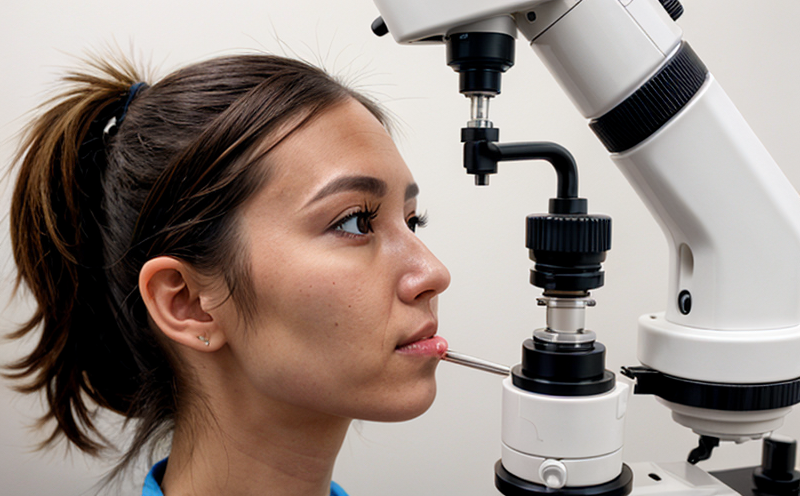ISO 11979-6 Intraocular Lens Shelf-Life and Stability Testing
The ISO 11979 series of standards provides a framework for the testing, evaluation, and characterization of medical devices used in ophthalmic surgery. Specifically, ISO 11979-6 focuses on the shelf-life and stability assessment of intraocular lenses (IOLs), which are critical components in modern ocular prostheses designed to restore vision after cataract surgery or other ocular ailments.
Shelf-life and stability testing is essential for ensuring that IOLs remain safe and effective over their intended period of use. This test ensures that the optical, mechanical, and biocompatibility properties of the lens are not compromised during storage and usage. The standard outlines a series of tests to evaluate these aspects:
- Optical performance: Ensuring the lens retains its refractive power.
- Mechanical performance: Evaluating resistance to deformation or damage under specified conditions.
- Biocompatibility: Assessing any potential adverse reactions in vivo.
The testing process involves several key steps, including:
- Sample Preparation: The IOLs are prepared according to the manufacturer's specifications. This may include sterilization and packaging as per ISO standards.
- Environmental Conditions: Samples are exposed to controlled environmental conditions that simulate real-world storage scenarios, such as temperature, humidity, and light exposure.
- Stress Testing: The lenses undergo mechanical stress tests designed to mimic the forces they may encounter during implantation or use.
- Optical Tests: Optical performance is measured using precision instruments like aberrometers and keratometers. These tests ensure that the IOL maintains its refractive properties over time.
The results of these tests are critical for medical device manufacturers, regulatory bodies, and healthcare professionals to ensure patient safety and efficacy. By adhering to ISO 11979-6, we can provide a high level of assurance that the IOLs will perform as intended throughout their shelf-life.
Eurolab Advantages
At Eurolab, we pride ourselves on delivering comprehensive and accurate medical device testing services. Our expertise in ophthalmic device testing allows us to provide unparalleled support for ISO 11979-6 compliance:
- State-of-the-Art Facilities: Our laboratories are equipped with the latest technology and instrumentation, ensuring precise and reliable results.
- Experienced Technicians: Our team of highly trained professionals has extensive experience in medical device testing, including IOL shelf-life assessment.
- Comprehensive Reporting: We provide detailed reports that not only meet regulatory requirements but also offer valuable insights for product improvement and development.
- Regulatory Expertise: Our compliance officers are familiar with all relevant standards and guidelines, ensuring your testing aligns with international best practices.
Our commitment to excellence is reflected in our high customer satisfaction rates. By choosing Eurolab for your ISO 11979-6 testing needs, you can be confident that your IOLs will meet the highest standards of safety and efficacy.
International Acceptance and Recognition
The ISO 11979-6 standard is widely recognized and accepted across the globe. It has been adopted by regulatory bodies, manufacturers, and healthcare professionals in countries around the world.
- United States: The Food and Drug Administration (FDA) often requires compliance with ISO standards for medical device approval.
- European Union: The European Commission recognizes ISO 11979-6 as a harmonized standard, making it a requirement for CE marking of IOLs.
- Australia and New Zealand: The Therapeutic Goods Administration (TGA) also accepts these standards as part of the regulatory process.
The widespread acceptance of ISO 11979-6 ensures that your testing results are recognized globally, facilitating easier market access for your products. This standardization not only enhances the reputation of your company but also simplifies the regulatory compliance process for international markets.
Environmental and Sustainability Contributions
Evaluating the shelf-life and stability of intraocular lenses is crucial not only from a safety standpoint but also in terms of sustainability. By ensuring that IOLs remain effective over their intended period, we contribute to reducing waste and the environmental impact associated with discarded medical devices.
- Reduced Waste: Proper shelf-life assessment helps manufacturers produce products that last longer, minimizing the need for frequent replacements and reducing the amount of medical waste sent to landfills.
- Energy Efficiency: The precision instruments used in these tests require minimal energy consumption, contributing to a more sustainable testing process.
- Better Resource Utilization: By ensuring that IOLs remain effective over their shelf-life, we optimize the use of resources and reduce unnecessary production and testing cycles.
The ISO 11979-6 standard aligns with broader sustainability goals by promoting efficient resource use and reducing environmental impact. Through this testing process, we contribute to a more sustainable healthcare industry.





